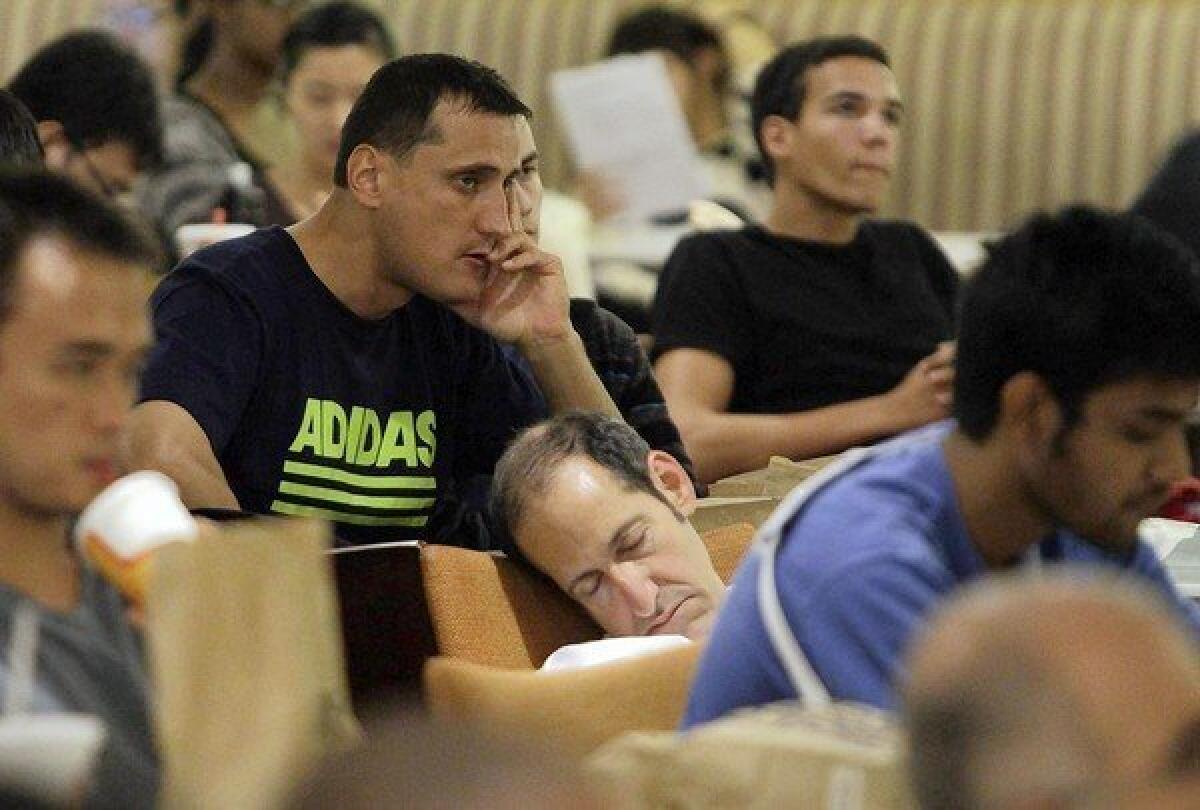A less dramatic, more cordial presidential debate

Minutes into the third presidential debate, a theme emerged: Lessons have been learned.
Don’t be rude to the moderator, don’t be afraid to call on the fact-checkers, and don’t forget to mention women’s rights as often as humanly possible.
Held on the 50th anniversary of President Kennedy’s televised announcement of the Cuban missile crisis, Monday night’s discussion was supposed to be about foreign policy, and for the most part it was — save for when both candidates strong-armed the narrative back to domestic shores to reiterate central arguments (Mitt Romney: I can fix the economy; President Obama: I am fixing the economy). But just as notable as the differences (and surprising number of similarities) of the two men’s opinions were the shifts in presentation and personal tone.
PHOTOS: The presidential debate
In fact, after the emotional roller-coaster of the previous two debates and the flop-sweat-inducing tension of the pundits — whoever wins tonight, many informed their viewers, will in all likelihood be president — it was, quite frankly, a bit of a bore. Which, programming-wise, was too bad since it was up against Game 7 of the National League Championship Series and “Monday Night Football.”
Unlike last week’s fierce and feisty debate, in which the town hall forum allowed the candidates to circle each other like gunslingers, Monday night’s exchange was similar to the vice presidential debate — the candidates confined to chairs behind a little round table, facing the moderator — which meant we were back to two talking heads on a split screen. And for better or worse, neither owned his space like Vice President Joe Biden.
Obama made the only real joke of the evening, countering Romney’s charge that the Navy has fewer ships today than it had in 1917 with, “We also have fewer horses and bayonets.” You could just imagine the moderator, CBS’ venerable Bob Schieffer, turning around daring the audience to laugh.
INTERACTIVE: Predict a winner in the battleground states
But there was no meme-ready “binders for women” moment. Obama managed to appear engaged without being enraged, wielding instead a deadly sort of politeness even when he accused his opponent, repeatedly, of flip-flopping and/or lying.
Meanwhile, Romney, always a soft-spoken man, for the most part stayed away from the “gotcha” moments, maintaining a small twist of a smile that could be read many ways, and reminding the audience that “attacking me is not a plan for the future.” So much had been made of last week’s theatrics that it seemed the two men were determined that testimony, not testosterone, would be the headline this time around.
And Schieffer made it clear he would be having no nonsense from either of them. He opened the proceedings by impressing upon the audience, in amiable but firm terms, that there were rules to which each campaign had agreed and those rules would be upheld. In other words, no interrupting, cross-talk, rolling over time limits, gum-chewing or abuse of the moderator in any form.
TRANSCRIPT: Final presidential debate
Oh, there was still enough bickering — over Syria, over Detroit, over the nature of campaign travel itinerary — to make the men’s apparently intense dislike for each other perfectly clear. But both Obama and Romney seemed determined that the personal would not overwhelm the political this time.
Women, on the other hand, found themselves, rather surprisingly, at the center of all foreign policy. Transparently attempting to close the gender gap, Romney mentioned equal rights for women within the first few moments of his first answer — which seemed odd since the question dealt with Libya.
Not to be outdone, the president went on to mention women’s rights at least half a dozen times over the course of the evening, tying them to virtually every issue (save the number of ships in the Navy) in a way that made gender equality seem like a cornerstone of American foreign policy. Who knew?
Both candidates got the message about respecting the moderator. Where Jim Lehrer was virtually ignored and Candy Crowley was both openly challenged and appealed to, Schieffer was treated with deference. When he called time, time was indeed called. When Romney attempted, just once, to insist he be given a chance to answer Obama’s points, Schieffer gently reminded him that he had made plenty of points of his own — and Romney, laughing, agreed.
Which may not have been as dramatic as defusing the Cuban missile crisis, but it was something.
PHOTOS, VIDEOS & MORE:
Timeline: Emmy winners through the years
Celebrity meltdowns
VIDEO: Watch the latest fall TV trailers here
More to Read
The complete guide to home viewing
Get Screen Gab for everything about the TV shows and streaming movies everyone’s talking about.
You may occasionally receive promotional content from the Los Angeles Times.







